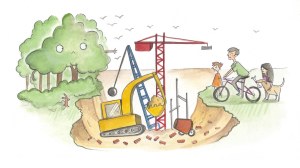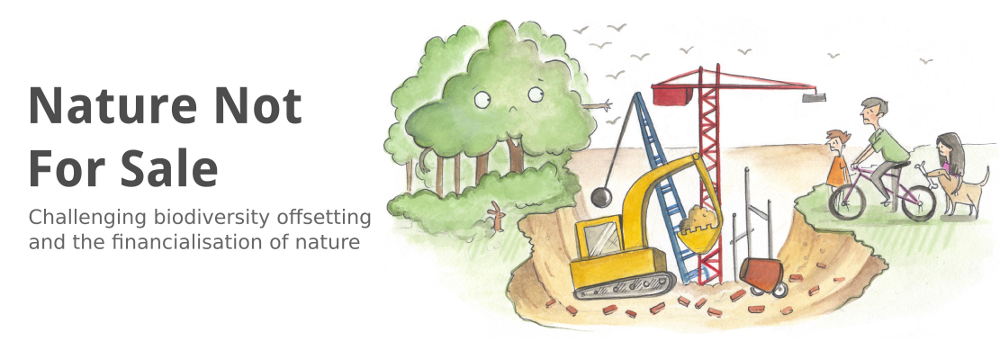Where and when 
- June 2nd, 5-8pm
- Regent’s Park Hub, London
Invitation
The UK government appears hell-bent on pushing through biodiversity offsetting – which will allow wildlife and habitats to be destroyed across the country, so long as it is ‘replaced’ elsewhere.
The policy is inherently flawed: biodiversity offsetting ignores the difficulties in recreating ecosystems, it overlooks the uniqueness of different habitats, and it disregards the importance of nature for local communities. Once a harmful development project goes ahead, communities lose access to it forever.
We believe it’s time to make space for nature and communities. At the 2nd Forum on Natural Commons, we bring together NGOs, academics, activists and the general public to discuss nature as a common good that benefits us all. Join us!
Why now?
This June, the UK Government is teaming up with an international collaboration of companies, financial institutions, government agencies and civil society organisations called the the Business and Biodiversity Offset Programme (BBOP), and the Zoological Society of London (ZSL London Zoo) to host the ‘first global conference’ on biodiversity offsetting, “To No Net Loss of Biodiversity and Beyond”.
The London-based summit involves more than 300 people from mining, finance, corporate, NGO, international agency and research sectors. It signals a real intensification of global policy efforts, championed by the UK government, to roll out biodiversity offsetting around the world.
What’s the problem?
We are concerned that the knowledge created and shared at this Summit will serve to reinforce what we believe is a dangerous and harmful policy, as it is currently being envisioned.
What are we doing about it?
We believe it’s time to make space for nature and communities. At the 2nd Forum on Natural Commons, happening in Regent’s Park, opposite the official summit, we bring together NGOs, academics, activists, journalists and the general public to challenge biodiversity offsetting as a flawed policy and will discuss how to protect nature as a common good that benefits us all. Join us!
Agenda
Panel 1: New directions in conservation: a closer look at ‘value’ and offsetting.
 A new conservation paradigm is emerging among policy makers; that in order to properly protect nature, it must be given a ‘proper value’. This usually means setting up ways to measure ecosystems and biodiversity in terms of pounds, dollars and euros so that nature, industry and economic growth can all appear on the same balance sheet.
A new conservation paradigm is emerging among policy makers; that in order to properly protect nature, it must be given a ‘proper value’. This usually means setting up ways to measure ecosystems and biodiversity in terms of pounds, dollars and euros so that nature, industry and economic growth can all appear on the same balance sheet.
This potent narrative underwrites much of the political energy that is currently directed at developing systems of ‘biodiversity offsetting’ around the world. Central to the concept is the idea that the ‘value’ of any particular item of biodiversity can be assessed against others and units of biodiversity value can be added up, divided and shifted around like figures in a spreadsheet. This is at the heart of the thinking behind ‘no net loss’ initiatives. It is an appealing (but fundamentally flawed) idea because it divorces the ‘value’ of biodiversity from the complex ecological, social and geographic relations that allow that biodiversity to exist.
Where did this new narrative for ‘value’ come from and how is it being engineered? Why is it treated as self-evident by policy makers and what does it conceal? This panel explores the new directions in global conservation policy, the difficult question of ‘value’ and its emergent role in environmental governance.
Facilitator: Sian Sullivan
Confirmed speakers:
o Jutta Kill, World Rainforest Movement
o John O’Neill, Manchester University
o Morgan Robertson, University of Wisconsin-Madison
o Mike Hannis, Bath Spa university and The Land magazine
Panel 2: Biodiversity offsetting and community rights
Access to nature is important for people’s well-being, health, prosperity and happiness. Whether shale gas, a new road or a large housing development, new development projects have an undoubtable environmental and social impact.
Biodiversity offsetting propagates the myth that people and nature are completely separate, by promising to neutralize the environmental impact of development by protecting or improving biodiversity elsewhere. This may lead to an increase in developments that infringe on community rights and access to nature. Land set aside for conservation within an offsetting scheme could lead to further land grabbing, taking land out of the hands of communities in order to serve corporate ‘environmental’ interests.
Nature is not something we can have elsewhere: it is not separate from people – this is the myth that offsetting propagates. We need to learn to live sustainably, meaning we need to challenge unneeded development, and make sure that development that does happen is as sustainable as possible.
What are the impacts of biodiversity offsetting likely to be on the ground, and what will it mean for communities struggling against development proposals? Owen Paterson MP said that offsets should be an hour’s drive away – but how far is too far? And is this really the point? This panel explores the implications of biodiversity offsetting on people, and how community rights are articulated in the global North and South.
Facilitator: Fred Pearce, Journalist
Confirmed speakers:
o Ian Scoones, co-director STEPS Centre
o Peter J Howard, Member of Landscape Research group
o Kathryn McWhirter, resident of Balcombe and Shale Gas campaigner
o Sylvia Kay, Transnational Institute
o Sarah Walters, woodland manager, Alvecote Wood
There will be a small cocktail after the event until 20h30
A photo exhibition from 13 different photographers can be visited in between and after the panel discussions. It aims to explore how natural areas cannot be offset and showcases just a few examples of brave community resistance from Romania, Brazil, Ecuador, France and the UK.
You can already visit the on-line version of the exhibition from here

Pingback: Love or Leave? The controversy about Biodiversity Offsets - Biodiversity Offsets Blog